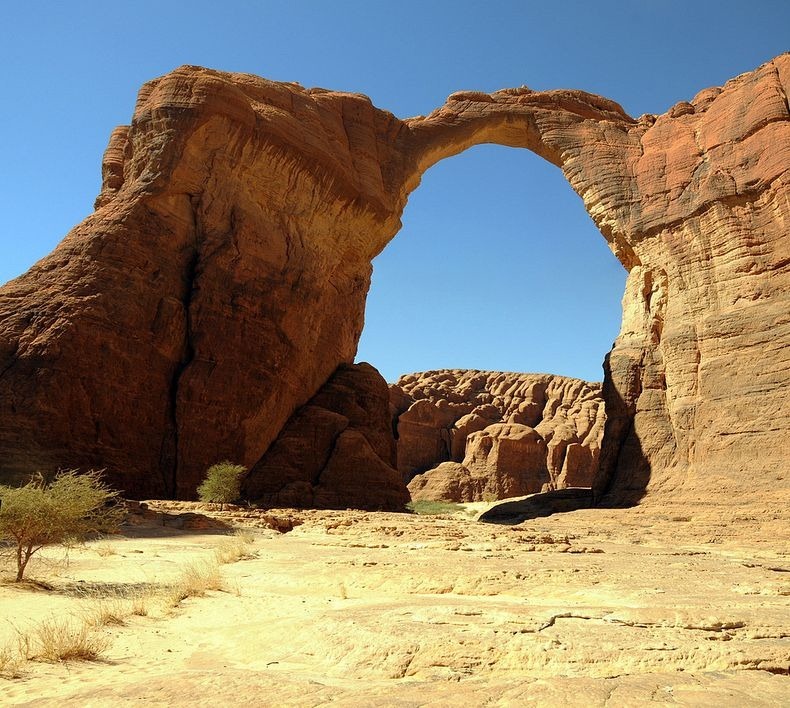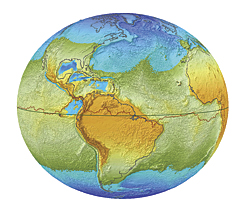| View previous topic :: View next topic |
Chad

In: Ramsbottom
|
|
 |
|
| Hatty wrote: | | The Pacific map clearly marks the Mariana Trench, where the water is deepest. Would this increased depth not add to the pressure? |
No not really. If you replaced the water with an equal depth of sand (or solid rock) then the pressure beneath it would be even greater, because these materials are denser (and thus heavier per unit volume) than water.
Incidentally, to answer your later question; ice is less dense (thus lighter per unit volume) than water ... which is why it floats.
|
|
 |
|
 |
|
Ishmael

In: Toronto
|
|
 |
|
As many of these rock formations show, the Sahara Desert (I suggest) was formerly beneath the oceanic, equatorial bulge. This was probably immediately prior to the most recent pole shift, as the depth was not great (as illustrated by these former islands).


|
|
 |
|
 |
|
Ishmael

In: Toronto
|
|
 |
|
Sichuan China, (also known as Szechwan, or Si ChuÄnl), meet Chihuahuan Mexico.
Both regions occupy latitudes between 33 and 25 degrees north. They are directly east-west of one another.
But it gets better.
Chihuahuan Mexico is located 105 degrees west of Greenwich. Sichuan China is located 105 degrees east of Greenwich.
Greenwich, of course, was only established in the 19th century.
|
|
 |
|
 |
|
Ishmael

In: Toronto
|
|
 |
|
How did I make this discovery?
For weeks now, I have been doing research related to the Chihuahuan desert. At first, I struggled with the pronunciation. Then suddenly I realized how to pronounce it. I had heard this name before.
Thing is; I'm such a poor speller, to me, this word Chihuahuan looked like it was pronounced Shish-wan -- which was a word I knew and knew vaguely that it was a place after which some sauce was named. This must be it, I thought. Szechwan.
Then just yesterday, I was looking at the word and realized it was actually spelled like the little mexican dog: Chihuahua.
Oh my god! This isn't the Szechwan desert after all. It's the "Chiwawa desert!"
So then where was Szechwan? I knew now that these words were much more similar than most people imagine.
What I learned, you can read above.
|
|
 |
|
 |
|
Ishmael

In: Toronto
|
|
 |
|
Centrifugal Oceanic Bulge

Part of what I have alleged regarding the Echos of the Ice Age is that the depth of the world's oceans alters dramatically depending on the orientation of the planet with respect to its spin axis. The movement of Tiawanaku away from the oceanic bulge of the equator was sufficient to lift the former coastal city thousands of feet above the ocean.
Some may express skepticism that such a dramatic change is possible. I encourage those who doubt to consult this document.
The author demonstrates that the floors of the oceans at the middle latitudes are wet only because of the spinning of the Earth. Absent the Earth's centrifugal force, today's ocean floor would be dry land.
|
|
 |
|
 |
|
Wile E. Coyote
In: Arizona
|
|
 |
|
| Ishmael wrote: | Bolivia
VI
When the Earth's pole shifted, the poor natives of Boliva lost their homes without ever having left them. Their sea-side communities were transported, perhaps in the briefest of time, 13,000 feet into the air. Those who had formerly lived on hillsides found themselves natives of mountain tops.
|
The shoreline of Titikawa is covered with millions of fossilized seashells. The fishes and seahorses in the lake are all oceanic types So it's freshwater lake with salt fauna and flora. It must have presumably either been on the ocean's edge or connected to the ocean, but it doesn't look like (to me) it was ever a river......
http://nephicode.blogspot.co.uk/2012/06/lake-titicacas-rise-to-its-present.html
|
|
 |
|
 |
|
|
|
|
 |
|
Ishmael said
| The vast desert of Turkmenistan, from the black sea to the Gobi desert, was once a vast inland sea. Before this, it had been part of the world ocean, pooling at the feet of the island continents of the Himalayas, when they occupied more southerly latitudes. |
Oceanic crust is basaltic. If I understand you correctly Ishmael then one would expect Turkmenistan to have basaltic geology. Does it?
|
|
 |
|
 |
|
Mick Harper
Site Admin

In: London
|
|
 |
|
| Oceanic crust is basaltic. |
What is the status of this claim? I ask because it's news to me and though there's no particular reason for me to have known it (or indeed to reject it) I find my AE antennae are twanging.
|
|
 |
|
 |
|
|
|
|
 |
|
Hatty said
| Is ice heavier than water? [We're told it's denser and therefore floats on water, but that doesn't answer the question. |
Actually it is the other way around (less dense), which is why it floats.
The weight of ice bearing down on Antarctica disguises the fact that the 'continent' would be an archipelago of large islands, if brought to the present day surface, though with an extensive continental shelf.
|
|
 |
|
 |
|
|
|
|
 |
|
The angle of tilt of the Earth's axis in respect of the plane of its orbit is supposed to vary from 22.1 to 24.5 degrees to the vertical in a cycle of 41,000 years. With the equatorial bulge caused by centrifugal force, would this be enough to explain the inundation or raising of land masses, Ishmael?
I can't help thinking that the melting of the Scandinavian and Laurentian Ice Caps since the most intense period of the current Ice Age is a simpler explanation for the inundation of continental shelf, Ishmael.
|
|
 |
|
 |
|
Mick Harper
Site Admin

In: London
|
|
 |
|
The weight of ice bearing down on Antarctica disguises the fact that the 'continent' would be an archipelago of large islands, if brought to the present day surface, though with an extensive continental shelf.
|
This is not entirely knowable. As far as I know, computing how much ice depresses how much land and how far is something we can only model using guestimates. Please advise if other, Aurelius.
Not that I mind since I use this very same phenomenon in my treatise on Greenland in SLOT and its extensions.
|
|
 |
|
 |
|
|
|
|
 |
|
| Mick Harper wrote: | | Oceanic crust is basaltic. |
What is the status of this claim? I ask because it's news to me and though there's no particular reason for me to have known it (or indeed to reject it) I find my AE antennae are twanging. |
It is classified as igneous, and is supposed to make up most of the ocean floor.
|
|
 |
|
 |
|
Mick Harper
Site Admin

In: London
|
|
 |
|
| in a cycle of 41,000 years |
Kindly explain how anybody knows this. Cycles, as you may or may not know, are an AE staple. We are highly sceptical of any that have not actually been lived through (and even then they turn out to be bollocks eg the trade cycle).
And by the way, AEists, everybody's waiting for El Nino at the moment (mainly to break the Californian drought) so I expect it will turn up any day now..
|
|
 |
|
 |
|
|
|
|
 |
|
| Mick Harper wrote: | The weight of ice bearing down on Antarctica disguises the fact that the 'continent' would be an archipelago of large islands, if brought to the present day surface, though with an extensive continental shelf.
|
This is not entirely knowable. As far as I know, computing how much ice depresses how much land and how far is something we can only model using guestimates. Please advise if other, Aurelius.
Not that I mind since I use this very same phenomenon in my treatise on Greenland in SLOT and its extensions. |
I agree not entirely knowable though putting 'Antarctica under ice map' or similar through a search engine will produce maps showing the present state of knowledge.
By the way apologies for the clumsy way I made one of my other posts, I'm just getting used to the AE software!
|
|
 |
|
 |
|
Mick Harper
Site Admin

In: London
|
|
 |
|
putting 'Antarctica under ice map' or similar through a search engine will produce maps showing the present state of knowledge.
|
No it won't. It will show the present state of theorising. It's a pretty important distinction.
|
|
 |
|
 |
|
|